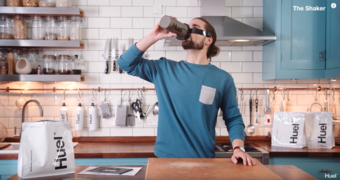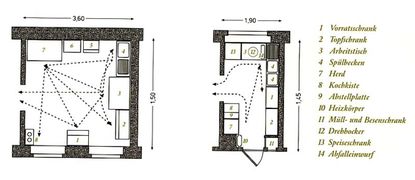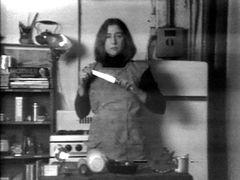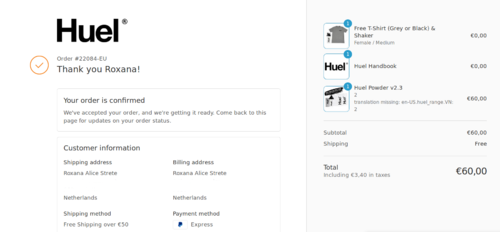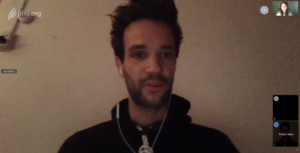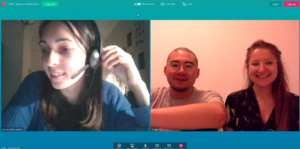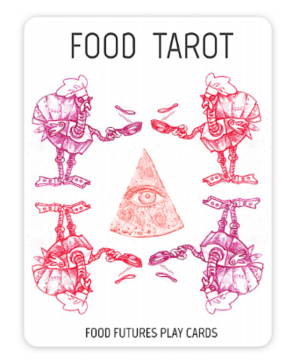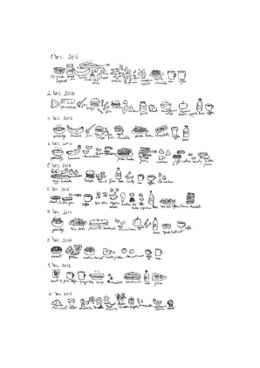User:Alice/Project proposal
FOCUS FOCUS FOCUS
What do you want to make
My focus is on the food practices of everyday life, magnifying the often overlooked actions we take every day regarding our sustenance, and reflecting on the reasoning behind our food-related decisions (de Certeau et al., 1998).
Workshop Food shapes our lives and our social interactions. This is why it's important for me to use food as a medium to discuss a broader social context. My project will take the form of a public research into specific food practices, focusing on the representation of food in tech culture, the political act of cooking as reclaiming independence over our bodies, and the shift towards the removal of cooking altogether. These topics will be analyzed through a series of events and experiments in which the participants would deconstruct the practice of cooking and discuss various procedures and ingredients taken for granted, take apart the structure of a recipe and reconstruct it based on their experiences.
Another aspect I want to analyze is the concept of collaborative cooking as performative act and ways of reconnecting and thinking critically about the food we eat on a daily basis. The first workshop, which will be tested in the py.rate.chnic session, will look at the act of communal cooking applied to contemporary variations on traditional food recipes. Participants will cook together either a vegan cake, or a liquid complete food cake, and reflect on the experience of preparing a dish together in these altered instances.
Media object
Another aspect of cooking that I want to focus on is its representation in tech culture. To discuss this perspective, I will work towards creating a media object which will attempt to speak back at to tech culture. (explain) In tech communities, cooking is often used as an analogy, in order to explain other technical processes and concepts, such as programming. This is done under the assumption that everyone is accustomed to the act of cooking, and can therefore understand more complex concepts through it. Furthermore, the recipe has often been compared to the computer program, and terms such as recipe and cookbook have been appropriated and used in the programming world to define pieces of code that perform a certain task. I see this as a sort of gimmick to ease people's understanding of complex issues, while diminishing the importance and complexity of the medium used for the explanation.
Eating is primarily done to satisfy the energy needs of a living organism (de Certeau et al., 1998), but the approach in food technology reduces food and cooking to an engineering process, in which efficiency is valued over pleasure. In startup culture, for instance, efficiency of the mind and body are the ultimate goal to achieve, and activities which slow people down in search of that goal need to be removed. In achieving that, cooking and eating meals have been replaced with drinking complete food liquid meals which contain all nutrients necessary for the entrepreneurial lifestyle, without the hassle of planning, prepping, chewing or cleaning.
How do you plan to make it
I want to conceptualize and host events related to food production, reflecting on the issues mentioned above. By looking at similar events and projects, I want to compare and contrast them in terms of approach, participants and outcomes. I am also interviewing several people who are or have been consumers and advocates for meal replacements. I plan to document my findings, which will turn into small publications.
At the same time, I want to reflect on my own habits around food production and consumption. For instance, in an attempt to understand the meal replacement phenomenon that has been adopted by the male tech world (Bowles, 2016), I will keep a liquid diet for as least a week, replacing two meals per day with their liquid equivalent, while keeping a detailed diary of my experience.
What is your timetable
Broad timeline:
Oct-Dec: Research, prototyping, gathering insights from key people/events Jan-Feb: Finalizing writing, organizing at least one event Mar-May: Solidifying the concept for the final project and how it can be translated into the grad show June-Jul: Final touches
Throughout my year of research, I plan to participate in a number of events which will give me more insights into my research topics. So far I have three lined up, in October, November and December. Nonetheless, I plan to start prototyping and testing with such events, starting as early as the [session which I have coming up in November] and continuing throughout the year. During the months of November and December, I also plan to interview a number of people on their food habits, specifically in relation to meal replacements.
Why do you want to make it
For me, food is political. [expand here] Reading on food culture, food history and other food related topics has been one of my main interests for many years, so this project comes as a natural progression for me. Furthermore, my recent introduction to the world of software and technology culture has opened new possibilities and insights. Now I want to explore the relationship between the two, how the principles connected to one can be transferred to another, what is lost and what is gained through the association of the two, and how one can critically inform the other.
A further point to make here is that I have come to programming from a completely different medium. For me, it is not the end goal, but a tool I use to prove a point, or to practice a concept. At times, when working on a project within this course, I feel like the focus shifts too much towards the technical aspects, and away from the conceptual, subjective, embodied self. Coming from a deep, lifelong interest in food culture, I find it surprising to see it now used as an 'easy way in' to tech world. I am conflicted on my position towards this path, but I am extremely interested in the critical exploration, and the social and political implications of this connection.
Another aspect that I am looking for with this project is creating a community around food culture. This is something I have been looking for for years, and have never been able to find/achieve/integrate in. An inclusive community of people keen on playful and critical experimentation with food, and insightful conversation on this aspect of our lives that is often overlooked, is definitely my goal. One step towards this would be to create a platform which brings together all kinds of food-related events and the people organizing and participating in these conversations.
Who can help you and how
Talking to people who have taken time to reflect on the relationship between humans and the food they eat is the most valuable source of information for me at this point. So far, Femke Snelting has been my biggest inspiration, since many of the topics I am reflecting on are part of the work she has already done in the past decade. Among her projects that inspire me are her essay on Stampott and her code inspired by Isabelle Beeton's instruction book for housewives.
Another person that I'm talking to is Marketa Dolejsova, who is also extremely active in the food scene and has developed a number of amazing projects. I met her in Utrecht during her workshop at CCU, Recipes for Sustainable Digital Food Futures and I plan to keep in touch with her in order to learn more about her practice. I am also interviewing a number of other people who have chosen to include liquid meals in their lifestyle, in the hope I will get more insight on their motivation.
Relation to previous practice
In the past couple of months I have researched quite a bit about women's relationship with technology. More specifically, I was interested in how women were first introduced to the technological world and were given tasks that seemed, at the time, menial and basic. These tasks eventually became the basis of programming today, a culture completely appropriated by men. This research materialized into a new programming language called over/under in which weaving instructions were translated into code and applied onto text.
Similarly, food production has always been associated with women's work, done behind closed doors, with little or no attention being given to it from the outside. In time, cooking has become appropriated by a different culture, hacking culture, stripped of its emotional layer and turned into a programmatic practice (Bowles, 2016). I want to reflect on this phenomenon and come up with ways to translate my own personal involvement.
Looking back even further, I have always been an avid reader of all things food-related, especially food in social and political contexts. The disconnection between our daily food habits and the whole world that exists behind the scenes has also been one of my main paths of exploration. My previous work has also involved shifting the focus from other daily activities which might seem more important or relevant, to the food consumed, the decisions that lead to the food consumed and the background of these decisions and how they reflect the way people relate to the world around them. For instance, I created a zine based on a food diary that I kept for an entire month, in which I documented through drawing every single thing I consumed, every day. I found it to be a very meaningful experiment, since it revealed my way of capturing my own life in memory, a way that largely revolves around the food I eat.
Relation to a larger context
As stated earlier, the one connection that jumps out right now is the appropriation of culture that has emerged in technology after World War 2, and is still ongoing today. I am also interested in the idea of food preparation as an anticapitalist political act (Pollan, 2014) in which people can become more than simple consumers in an industry ruled by big corporations. As an opposing trend, I am also extremely interested in the socio-economic and political (neoliberal) context in which there has been a rise in food-like substances meant to replace real meals with nutrient-packed powders sold by startups around the world, in yet another expression of techno-solutionism.
References
For a complete bibliography, head over here.
Bowles, N. (2016) Food tech is just men rebranding what women have done for decades. The Guardian, [online]. Available at: https://www.theguardian.com/technology/2016/apr/01/food-technology-soylent-slimfast-juice-fasting [Accessed 12.11.2018]
Brillat-Savarin, J.-A.(1994) The Physiology of Taste. London:Penguin Books.
Busch, A.(1999) Kitchen, in: Geography of Home: Writings on Where We Live. New York: Princeton Architectural Press. pp.39–50.
Cairns, K., Johnston, J., Baumann, S.(2010) Caring About Food: Doing Gender in the Foodie Kitchen. Gender and Society 24, pp.591–615.place needed
Davies, S.R. (2017) Hackerspaces: Making the Maker Movement. Cambridge: Polity Press.
de Certeau, M., Giard, L., Mayol, P. (1998) The Practice of Everyday Life, Volume 2: Living and Cooking. Minneapolis: University of Minnesota Press.
Dunne, A., Raby, F. (2013) Speculative Everything. Design, Fiction, and Social Dreaming. Cambridge, Massachusetts: The MIT Press.
German, L. (1989) Sex, Class and Socialism. Bookmarks, University of California.
Pollan, M. (2014) Cooked: A Natural History of Transformation. London:Penguin Books.
Steel, C. (2008) Hungry City: How Food Shapes Our Lives. London:Vintage.
Snelting, F.

